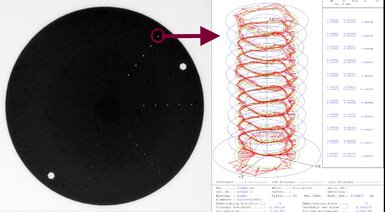News
Metrology Partnership project is addressing the issue of microplastics in food and the environment
Creating a metrological infrastructure to measure small microplastics and nano-plastics
Plastic pollution is recognised as a severe anthropogenic issue globally, where complex physico-chemical transformation processes such as aging, degradation and fragmentation produce microplastics (MPs) and, subsequently, nanoplastics (NPs).
This occurs during production, consumer use and waste processing. The resulting plastic particles accumulate in the environment, including in the water and soil, and can cross biological barriers, accumulating within organisms. The EU Plastics Strategy has named reducing microplastic release as a key objective for fulfilling the European Union’s circular economy action plan.
Several studies have reported the occurrence, analytical methods and toxicity of larger MPs in the environment and food matrices. However, small MPs (< 100 μm) and NPs (< 0.1 µm) in natural systems have been overlooked, primarily due to the significant methodological challenges associated with their micro- and nano-specific properties.
The recently started Metrology Partnership project Metrological traceability of measurement data from nano- to small-microplastics for a greener environment and food safety (21GRD07, PlasticTrace) will create methods for measuring and characterising small microplastics and nanoplastics. This will account for composition, size distribution and morphology, and will produce appropriate, realistic reference materials.
The project will also develop sample preparation methods and create a good practice guide for measuring and characterising SMP/NPs in food and the environment. This infrastructure will enable traceable monitoring of SMP/NPs, supporting decision-making and mitigation measures around plastic pollution. It will also support future technologies, such as biodegradable bioplastics, and improvements to the health impacts of industries such as food packaging and water management.
Project coordinator Andrea Mario Giovannozzi from INRIM said
“PlasticTrace is creating a solid and synergic networking with the main actors on the microplastics topic at both European and International level, including standardization bodies (ISOTC147/SC2/JWG1), pre-normative activities (VAMAST WA45) and European projects (EUROqCHARM, POLYRISK, PlasticsFatE, CUSP, Priority) for the harmonization of the methods and the development of reference materials, which constitute the fundamental base for an active contamination monitoring, future risk assessment and dietary exposure.
An active network of stakeholders which include environmental agencies, food producers, instrument makers has been already set for the proper involvement and dissemination of the PlasticTrace outputs. At the moment, candidate reference materials for both small-micro and nanoplastics are in preparation and will be promptly characterized in terms of homogeneity and stability with both thermoanalytical and spectroscopic methods. We expect to use them soon for the development of the methods in some selected matrices such as surface water and milk."
For further information please visit the project website.
The project has received funding from the European Partnership on Metrology, co-financed from the European Union's Horizon Europe Research and Innovation Programme and by the Participating States.
Want to hear more about EURAMET?
Information
- European Partnership on Metrology,
- EMN Pollution Monitoring,
- EMN Safe and Sustainable Food,
- World Metrology Day,
Developing quantum electric current standards to underpin digital transformation more
Creating a metrological infrastructure to monitor biomethane for use in transportation and gas networks more
Memristive devices that can be used as resistance standard or can be used for computing applications more
Supporting the digital transformation in Europe by monitoring the detail detection sensitivity of iCT measurements more
Validated, SI-traceable reference methods and materials to assess trace elements in discarded goods more






